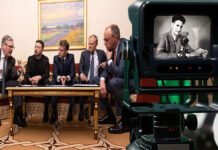Pope Francis disparaged so-called trickle-down economic theory, saying the pandemic has shown that free-market policies cannot solve all of humanity’s most dire needs.
In a 70-page encyclical, the highest form of papal teaching, Pope Francis outlined his vision for a post-pandemic world.
“The marketplace by itself cannot resolve every problem, however much we are asked to believe this dogma of neoliberal faith,” the pope wrote.
He added that free-market capitalism “reproduces itself” by resorting to the magic theories of “spillover” or “trickle” as the only solution to societal problems.
The pope said this “spillover” does not “resolve the inequality that gives rise to new forms of violence threatening the fabric of society.”
The encyclical, called “Fratelli Tutti,” or “Brothers All,” reiterated the pope’s vision for a more communal society, which extends to the use of private property.
A papal encyclical is one of the most important types of communication by the pope and serves as a foundation for Catholic teaching by taking a position on important issues.
What the pope said about capitalism
In his encyclical, Pope Francis denounced the “magic theories” of market capitalism of “as the only solution to societal problems.”
“There is little appreciation of the fact that the alleged ‘spillover’ does not resolve the inequality that gives rise to new forms of violence threatening the fabric of society,” the pope said.
“There were those who would have had us believe that freedom of the market was sufficient to keep everything secure (after the pandemic hit),” he wrote.
I offer this social Encyclical as a modest contribution to continued reflection, in the hope that in the face of present-day attempts to eliminate or ignore others, we may prove capable of responding with a new vision of fraternity and social friendship. #FratelliTutti pic.twitter.com/P3qso8k8qM
— Pope Francis (@Pontifex) October 3, 2020
“The fragility of world systems in the face of the pandemic has demonstrated that not everything can be resolved by market freedom.”
“It is imperative to have a proactive economic policy directed at ‘promoting an economy that favors productive diversity and business creativity’ and makes it possible for jobs to be created, not cut.”
The pope also restated the past calls for the redistribution of wealth, saying those with much should “administer it for the good of all.” But he clarified that he was “not proposing an authoritarian and abstract universalism.”
He hoped the global coronavirus pandemic, which has killed more than 1 million people worldwide, would inspire a reassessement of global priorities.
“Once this health crisis passes, our worst response would be to plunge even more deeply into feverish consumerism and new forms of egotistic self-preservation,” he said.
Other topics the pope addressed
War: Francis rejected the Catholic Church’s own doctrine of justifying war as a means of legitimate defense. He said the doctrine was applied too broadly throughout history and is no longer viable.
“It is very difficult nowadays to invoke the rational criteria elaborated in earlier centuries to speak of the possibility of a ‘just war.'”
Nationalism: The pope spoke of a “certain regression” in global affairs. “Ancient conflicts thought long buried are breaking out anew, while instances of a myopic, extremist, resentful and aggressive nationalism are on the rise.”
He called for “a global fraternity based on the practice of social friendship on the part of peoples and nations calls for a better kind of politics, one truly at the service of the common good.”
Social media: A self-declared computer illiterate, Pope Francis deplored how “social aggression has found unparalleled room for expansion through computers and mobile devices.”
“Things that until a few years ago could not be said by anyone without risking the loss of universal respect can now be said with impunity, and in the crudest of terms, even by some political figures.”
Private property: “The Christian tradition has never recognized the right to private property as absolute or inviolable and has stressed the social purpose of all forms of private property,” the pope wrote.
Immigration: The encyclical covers a wide range of social topics including immigration, the death penalty, populism and economic injustice.
Racism: He also touched on racism, calling it a “virus that quickly mutates and instead of disappearing goes into hiding and lurks in waiting.”
The pope also questioned why it took so long for the Catholic Church to unequivocally to condemn slavery.
wmr, dv/sms (AP, dpa, Reuters)
Support Independent Journalism Today
Our unwavering dedication is to provide you with unbiased news, diverse perspectives, and insightful opinions. We're on a mission to ensure that those in positions of power are held accountable for their actions, but we can't do it alone. Labour Heartlands is primarily funded by me, Paul Knaggs, and by the generous contributions of readers like you. Your donations keep us going and help us uphold the principles of independent journalism. Join us in our quest for truth, transparency, and accountability – donate today and be a part of our mission!
Like everyone else, we're facing challenges, and we need your help to stay online and continue providing crucial journalism. Every contribution, no matter how small, goes a long way in helping us thrive. By becoming one of our donors, you become a vital part of our mission to uncover the truth and uphold the values of democracy.
While we maintain our independence from political affiliations, we stand united against corruption, injustice, and the erosion of free speech, truth, and democracy. We believe in the power of accurate information in a democracy, and we consider facts non-negotiable.
Your support, no matter the amount, can make a significant impact. Together, we can make a difference and continue our journey toward a more informed and just society.
Thank you for supporting Labour Heartlands












